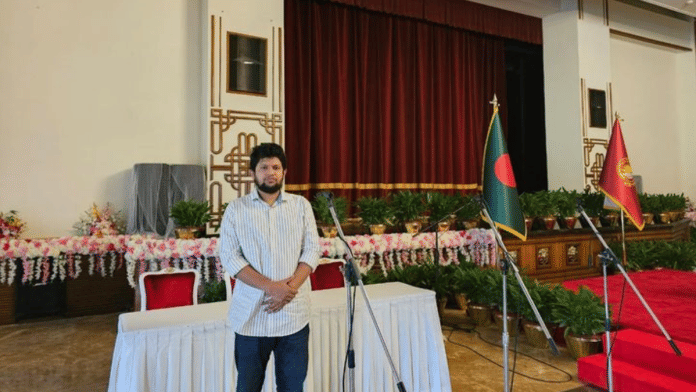New Delhi: The Bangladesh interim government has removed a portrait of the country’s first president and founding father Sheikh Mujibur Rahman from the official residence and workplace of the president, a student leader confirmed to ThePrint.
Abu Bakar Majumder, a national coordinator of the Students Against Discrimination Movement, said that the portrait of Mujib was removed Monday morning from the Darbar Hall of the Bangabhavan.
Although the student leader could not confirm if Mujibur’s portraits at other sections of the Bangabhavan, he confirmed that all of them may well have been removed or will be removed shortly.
Article 4 A of the Bangladesh’s Constitution mandates that the portrait of Mujibur shall be preserved and displayed at all government institutions and related bodies such as at offices of the President, the Prime Minister, the Speaker and the Chief Justice and in head and branch offices of all government and semi-government offices, autonomous bodies, statutory public authorities, government and non-government educational institutions, embassies, and missions.
Another student leader Mohammad Mahfuj Alam, who was described as the “brain” behind the student movement that ousted the Sheikh Hasina government in August, informed Monday about the development on Facebook.
Alam was sworn in as an ‘adviser’ to the Muhammad Yunus-led interim government on Sunday.
The development comes immediately a day after members of Hasina’s party Awami League and aligned activists were barred from assembling at Zero Point in Dahaka’s Gulistan area by a group of students, and members of rival parties, the Bangladesh Nationalist Party and the Jamaat-e-Islami. The Awami League had called on its party workers and grassroots activists to gather at the Zero Point to demonstrate their angst against “misrule” of the interim government headed by chief adviser Muhammad Yunus.
Earlier last month, Yunus himself had announced that the interim government had cancelled eight national holidays, including the birth and death anniversary of Mujib on 17 March and 15 August, respectively.
‘Post ‘71 fascist’
Offering an apology for delaying the removal of portraits from Bangabhavan, Alam said that now that it has been done, Mujib won’t be seen anywhere till the spirit of people who protested against Hasina’s government leading to the overthrow of the government lives on.
Additionally, describing Mujib as “post ‘71 fascist”, Alam sought acknowledgement and apology from the Awami League over series of alleged crimes such as bringing a “non-democratic” constitution in 1972 to extra judicial killings in between 1972 and 1975 when Mujib was the president and since 2009 when Hasina came back to power as prime minister.
“The photo of Sheikh Mujibur Rahman- Post ’71 Fascist, is Removed from Darbar Hall. It is a shame for us that we Couldn’t remove his pictures from Bangabhaban after the 5th of August. Apologies. But, he Won’t be seen anywhere till people’s July spirit lives on,” Alam wrote on his verified Facebook profile.
“BAL (Bangladesh Awami League) must acknowledge and apologise for what Sheikh Mujib and his Daughter have done to the people of Bangladesh, starting from Non- democratic ’72 constitution to famine, laundering of Billions and extrajudicial killings of thousands of dissidents and opponents (72-75, 2009-2024). Then, we can talk about Pre ’71 Sheikh Mujib. Without apologies and Trials of fascists, there Won’t be any kind of reconciliation (sic),” he wrote and posted a picture on Facebook.
In an interview with Voice of America published in the first week of October, Yunus had spoken about “pressing the reset button” that created a storm in Bangladesh and abroad. His press office had quickly clarified that the chief adviser did not mean to say the erosion of the country’s “glorious past” when he used the term “reset”.
“When Chief Adviser Professor Muhammad Yunus spoke about pressing the reset button, he meant making a new start from corrupt politics, which destroyed all Bangladesh’s key institutions, pushed the economy to the brink of collapse and robbed the rights to vote and civil liberties of tens of millions of people. He did not mean wiping out Bangladesh’s proud history,” a statement released by Yunus’ office said.
“When you press the reset button, you reset the software to start all over again. It doesn’t change the hardware. The 1971 Liberation War created the hardware of Bangladesh,” it added.
(Edited by Tony Rai)
Also Read: Sheikh Hasina calls herself ‘prime minister’ of Bangladesh in letter congratulating Donald Trump






